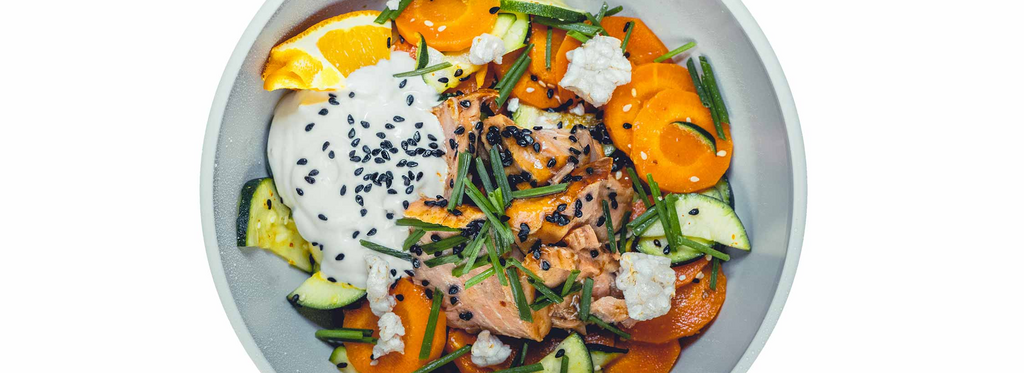Plantarianism and plant-based nutrition
The increased focus on health combined with a greater level of quality awareness shows no sign of stopping. As a consequence, plantarianism, a plant-oriented diet with a focus on vegan and vegetarian elements, is becoming increasingly relevant. That development goes hand in hand with a reduction in the consumption of meat and fish. Demand for alternative sources of protein, including algae, is continuously increasing, and both the variety and quality of the relevant products have noticeably improved and continue to do so.
Biohacking and the next level of health optimisation
Biohacking is gaining popularity as a logical step towards self-optimisation, as people look to get the best out of their body and mind. The trend involves individual approaches that can include high-protein meals, intermittent fasting, low-carb or ketogenic diets and bulletproof coffee – coffee enriched with melted butter or ghee. The idea behind this is that the fats in the coffee ensure a longer-lasting energy boost and suppress hunger, while the coffee itself increases alertness and concentration. The ‘next level’ of health optimisation, which is being driven by Gen Z in particular, is the ‘NoLo’ (no/low) trend: voluntary reduction of or abstention from the consumption of alcohol, sugar or salt, for example. In the restaurant sector, guests expect a wide range of dishes that meet those requirements, as well as gluten-free, lactose-free and allergen-free options.
Sustainable alternatives
The market is providing innovative solutions in response to the growing demand for healthy alternatives. One example of this is the start-up Planet A Foods, which produces a sustainable chocolate alternative called ChoViva. It is made from locally grown, roasted and fermented oats and sunflower seeds and contains 30% less sugar than conventional chocolate. Its sustainable production ensures short supply chains and helps to reduce the threat to rainforests.
Crisis-related setbacks
Although the trend towards greater health awareness shows no sign of stopping, crises such as the ongoing economic uncertainty and the COVID-19 pandemic have led to temporary setbacks. Consumers are increasingly price-aware and we are also seeing an increase in inconsistent decisions, such as a decline in sales of organic products and a simultaneous increase in sales of chips in the foodservice and hospitality market.
Personalised nutrition
Explanation
The idea of personalised nutrition is based on personal preferences and adapting these to health needs. Customised nutritional concepts are created through analyses of the metabolism, genetic profile, health condition, lifestyle and preferences of the individual. The idea of better adapting nutrition to individual health requirements is a subject with great potential for the future that is currently being researched and tested.
Practical examples in Europe
The first versions of personalised nutrition concepts have already been implemented. One notable example is the branch of the YO! Sushi chain (100 restaurants worldwide) in London with its DNA dining concept ‘YO! Dinner, YO! Way’. This involves a personalised menu based on DNA analysis carried out in advance. Guests are sent a DNA kit to identify their individual needs and any nutritional deficiencies. Gousto DNA Dishes in London works in a similar way. Following a DNA analysis, customers receive personalised cooking boxes for meals that correspond to their origin and are tailored to their individual metabolism.
Changes in the catering industry
Challenges posed by crises
The catering industry is facing a variety of challenges: although the coronavirus pandemic has now subsided, many people continue to work from home. The general development of new ways of working and the ongoing price awareness of guests are impeding the upturn in the segment.
New concepts for staff canteens
To meet these challenges, innovative concepts are being developed for staff canteens, as well as hospitals. Some companies are working on smart vending machines for self-sufficient, fresh company catering 24/7. These range from individual vending machines to containers with bistros and make use of mobile ordering via smartphone, QR code management and sustainable production by CloudKitchens. The latter ensures maximum freshness, as the food is freshly prepared there each day. The dishes are then delivered cold to the smart vending machines, from which they can be removed and heated when required. The reusable tableware is also returned via the vending machines. No employees are required on-site, as everything is automated. Smart vending machines are a solution that suits the zeitgeist: the systems developed are intended to be sustainable, avoid food waste and flexibly offer fresh products 24/7.
Value and appreciation in hospital catering
There is a trend towards a more feel-good atmosphere in hospital catering. Patients are being treated more like guests, and healthier, fresher and tastier meals are increasingly being offered. Hospitals like the one at University Medical Center+ in Maastricht are testing out personalised meals. Patients can have visitors bring their own food and eat it in the hospital – in compliance with the prescribed diet, of course – or order a meal for their visitor or carer, too.
Specialised nutrition as a solution to illnesses
A change in diet or a special nutritional plan is also being used in cases of illnesses including fatigue, headaches and migraines, as well as ADHD. ‘Nutrition docs’ also provide consultation on specific illnesses and nutritional problems, while apps for personalised nutrition are already on the market:
• LYKON: The metabolic type is analysed using a DNA test and a personalised nutrition plan is developed. The app is primarily used for weight loss and food intolerances.
• MillionFriends: Blood sugar levels are measured with a sensor for a fortnight to establish how the user reacts to a variety of foods. Users receive personalised tips and recipe suggestions tailored to their needs (e.g. weight loss or muscle building). The app can be combined with a fitness tracker.
Significance and lessons for the foodservice and hospitality market
The inexorable shift towards a stronger focus on health and greater quality awareness among guests simultaneously presents the foodservice and hospitality market with both significant challenges and major opportunities. Despite the minor setbacks caused by crises such as growing price awareness and inconsistent decisions, approaches to excite guests are clearly available.
Having a diverse range is becoming key to satisfying the evolving nutritional trends. The growth of plantarianism – a more plant-oriented diet with primarily vegan and vegetarian elements including alternative protein sources – is just as relevant as the focus on ‘NoLo’ (no/low content of specific ingredients).
Higher standards for gluten-free, lactose-free and allergen-free food are required. Personalised nutrition is also becoming increasingly important, as demonstrated by DNA dining concepts from restaurants and delivery services, as well as the introduction of DNA apps for guests.
For successful market positioning, new catering concepts should utilise the potential of digitalisation and AI. Healthy food is becoming a key factor, supported by flexible 24/7 solutions such as innovative vending machines with mobile ordering and a range of fresh and healthy options.
A new, customised approach is needed in the care sector, where patients are becoming guests. Catering in the care sector should be redesigned with this in mind and a more personalised approach that meets people’s individual needs should be taken.
Summary
The future of the restaurant and catering sectors will be shaped by a stronger focus on health, greater quality awareness and innovative concepts. Following a path towards sustainable, personalised nutrition together with flexible and digitalised solutions will be key to success in this rapidly changing market. Industry players should adjust to these trends and integrate them into their strategies in order to meet the increasing demands and expectations of guests and remain competitive.
Karin Tischer and INTERNORGA FoodZoom
Karin Tischer, the internationally recognised food trend researcher and founder of the food & more research and development institute in Kaarst, compiles the annual INTERNORGA FoodZoom trend analysis for the foodservice and hospitality market on behalf of INTERNORGA. It provides an exciting summary of the food and beverage trends that are shaping the industry. food & more has been developing concepts, innovations and recipes for industry, the foodservice and hospitality market (from large-scale systems to start-ups), B2B providers and retailers for 27 years and is involved in trend research worldwide.
Karin Tischer’s Pink Cube has been the trend forum at INTERNORGA for 11 years and will be presented on the Open Stage for the first time in 2024.


